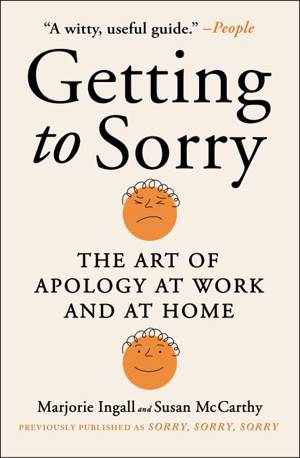
Je cadeautjes zeker op tijd in huis hebben voor de feestdagen? Kom langs in onze winkels en vind het perfecte geschenk!
- Afhalen na 1 uur in een winkel met voorraad
- Gratis thuislevering in België vanaf € 30
- Ruim aanbod met 7 miljoen producten
Je cadeautjes zeker op tijd in huis hebben voor de feestdagen? Kom langs in onze winkels en vind het perfecte geschenk!
- Afhalen na 1 uur in een winkel met voorraad
- Gratis thuislevering in België vanaf € 30
- Ruim aanbod met 7 miljoen producten
Zoeken
Getting to Sorry E-BOOK
The Art of Apology at Work and at Home
Marjorie Ingall, Susan McCarthy
E-book | Engels
€ 16,76
+ 16 punten
Omschrijving
“A witty, useful guide” (People) to apologies, why they matter, and the healing power of saying you’re sorry, from the dynamic duo behind the acclaimed SorryWatch site.
It’s a truth universally acknowledged that terrible apologies are the worst. We’ve all been on the receiving end, and oh, how they make us seethe. Horrible public apologies—excuse-laden, victim blame-y, weaselly statements—often go viral instantaneously, whether they’re from a celebrity, a politician, or a blogger. We all recognize bad apologies when we hear them. So why is it so hard to apologize well? How can we do better? How could they do better?
Marjorie Ingall and Susan McCarthy show us the way with this fresh book that is “philosophically deep, crisply reported, and funny as heck all the way through” (Clive Thompson, author of Coders). Drawing on a deep well of research in psychology, sociology, law, and medicine, they explain why a good apology is hard to find and why it doesn’t have to be. Alongside their six (and a half)-step formula for apologizing beautifully, Ingall and McCarthy also delve into how to respond to a bad apology; why corporations, celebrities, and governments seldom apologize well; how to teach children to apologize; how gender and race affect both apologies and forgiveness; and most of all, why good apologies are essential, powerful, and restorative.
It’s a truth universally acknowledged that terrible apologies are the worst. We’ve all been on the receiving end, and oh, how they make us seethe. Horrible public apologies—excuse-laden, victim blame-y, weaselly statements—often go viral instantaneously, whether they’re from a celebrity, a politician, or a blogger. We all recognize bad apologies when we hear them. So why is it so hard to apologize well? How can we do better? How could they do better?
Marjorie Ingall and Susan McCarthy show us the way with this fresh book that is “philosophically deep, crisply reported, and funny as heck all the way through” (Clive Thompson, author of Coders). Drawing on a deep well of research in psychology, sociology, law, and medicine, they explain why a good apology is hard to find and why it doesn’t have to be. Alongside their six (and a half)-step formula for apologizing beautifully, Ingall and McCarthy also delve into how to respond to a bad apology; why corporations, celebrities, and governments seldom apologize well; how to teach children to apologize; how gender and race affect both apologies and forgiveness; and most of all, why good apologies are essential, powerful, and restorative.
Specificaties
Betrokkenen
- Auteur(s):
- Uitgeverij:
Inhoud
- Aantal bladzijden:
- 368
- Taal:
- Engels
Eigenschappen
- Productcode (EAN):
- 9781982163518
- Verschijningsdatum:
- 9/01/2023
- Uitvoering:
- E-book
- Beveiligd met:
- Adobe DRM
- Formaat:
- ePub

Alleen bij Standaard Boekhandel
+ 16 punten op je klantenkaart van Standaard Boekhandel
Beoordelingen
We publiceren alleen reviews die voldoen aan de voorwaarden voor reviews. Bekijk onze voorwaarden voor reviews.









